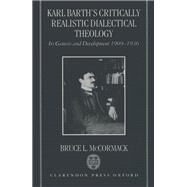Karl Barth's Critically Realistic Dialectical Theology Its Genesis and Development 1909-1936
, by McCormack, Bruce L.- ISBN: 9780198269564 | 0198269560
- Cover: Paperback
- Copyright: 4/24/1997
'McCormack is master of this voluminous material. He is scrupulously at home in the intricate, dramatic background of Swiss socialist politics ...The result is a masterly study, often as compelling as its theme.' George Steiner, Times Literary Supplement 'This meticulous and definitive study ... supersedes most previous interpretations.' Colin Gunton, Theological Book Review 'it should quickly attain classic status. It is an exceptionally fine and erudite piece of work....The results of this painstaking attention to detail are truly ground-breaking. This is a major intellectual achievement, an interpretative act of great courage, and Barth studies will never look thesame.' Graham Ward, Expository Times This book is a new, major intellectual biography of perhaps the most influential theologian of the twentieth century, Karl Barth. It offers the first full-scale revision of the well-known theologian Hans Urs Balthasar's seminal interpretation of Barth, which was first published in 1951. Drawing ona wealth of material, much of it unpublished during Barth's lifetime, as well as a thorough acquaintance with the best of recent German scholarship, Professor McCormack demonstrates that the fundamental decision which would control the whole of Barth's development - the turn to a new, criticallyrealistic form of theological objectivism - was already made during the years in which Barth was at work on his first commentary on Romans. Professor McCormack further argues that the most significant subsequent decisions - both material and methodological - were made in Barth's Gottingen Dogmaticsof 1924/5, and not later in the 1931 book on Anselm, as has often been alleged. Finally, he seeks to show that von Balthasar's description of a turn from dialectic to analogy, which provided the foundation for the neo-orthodox reading of Barth in the English-speaking world, fails to take seriouslyenough the extent to which dialectic remained a constitutive feature of Barth's outlook in the Church Dogmatics. This unique and important work provides not simply a fresh interpretation of Barth's development, but also a new paradigm for understanding the whole of Barth's theology.






